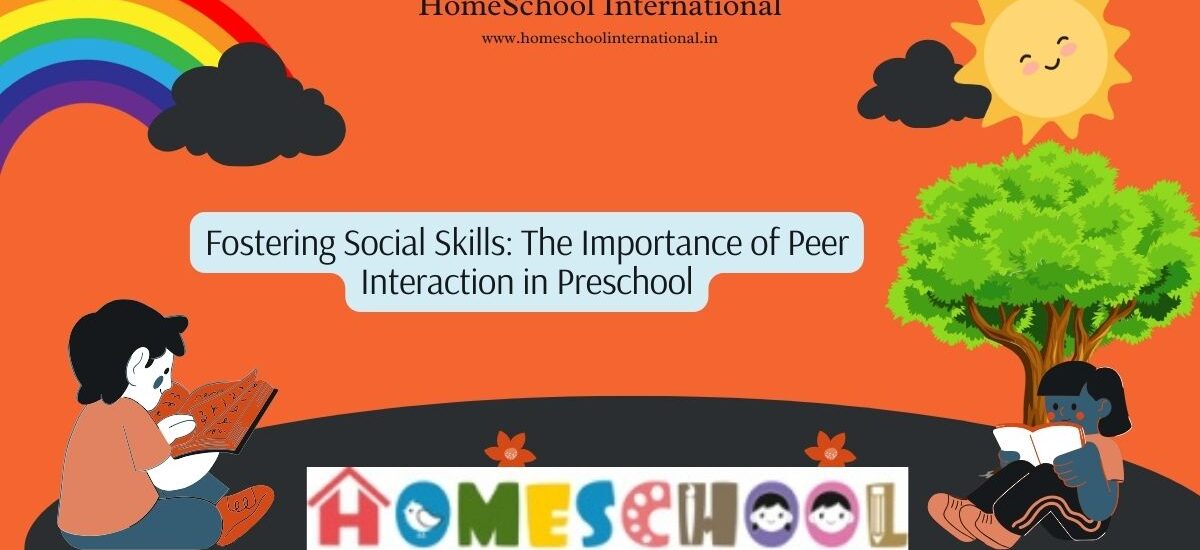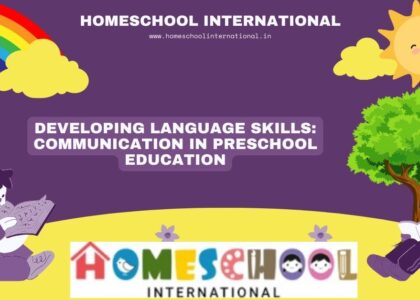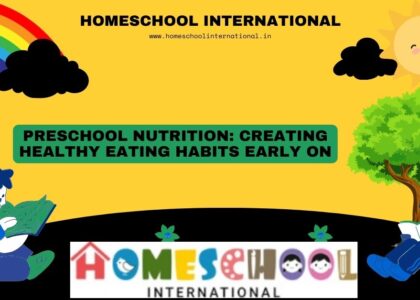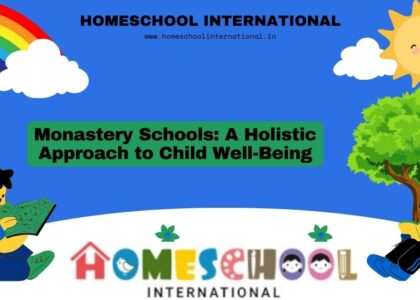Fostering Social Skills: The Importance of Peer Interaction in Preschool- In the vibrant world of early childhood education, fostering social skills is paramount to a child’s overall development. One of the cornerstones of this social growth is the interaction with peers. Welcome to our exploration of “Fostering Social Skills: The Importance of Peer Interaction in Preschool.” At Homeschool International, we recognize the crucial role that peer interaction plays in shaping children’s social competence and emotional well-being during their formative years. In this blog post, we delve into the significance of peer interaction in preschool settings, examining how it influences social development and lays the groundwork for future interpersonal relationships. Join us as we uncover the transformative power of peer interaction and explore strategies for creating supportive environments where children can thrive socially and emotionally.
Also Check: Daycare Dilemmas: Tips for Selecting the Ideal Childcare Provider
The Impact of Peer Interaction on Social Development
In the landscape of early childhood education, the interactions that unfold between preschoolers are pivotal in shaping their social skills. Research underscores the profound impact of positive peer relationships on various aspects of social development. In this section, we delve into the multifaceted influence of peer interaction, exploring how it contributes to the acquisition of crucial social skills such as communication, cooperation, and empathy.
Building Blocks of Social Competence: Positive interactions with peers act as building blocks for the development of social competence. Children engaged in peer play learn to navigate social dynamics, share resources, and communicate effectively. These foundational experiences set the stage for the cultivation of empathy, emotional regulation, and the ability to form meaningful connections with others.
Research Findings on Peer Relationships in Preschool: Numerous studies highlight the importance of positive peer relationships in preschool settings. Children who engage in constructive peer interactions tend to demonstrate enhanced language skills, improved emotional intelligence, and a greater capacity for resolving conflicts. As we explore these research findings, it becomes evident that peer interaction serves as a catalyst for holistic social development.
The Role of Peer Play in Fostering Social Skills: Peer play, characterized by collaboration and imaginative exploration, plays a pivotal role in fostering social skills among preschoolers. Whether engaging in pretend play, sharing toys, or working together on a project, children learn valuable lessons in cooperation, negotiation, and perspective-taking. Educators play a crucial role in facilitating these interactions, creating environments that promote positive peer engagement.
Creating a Supportive Peer Environment
In the nurturing environment of preschools, it’s essential to cultivate a supportive atmosphere where peer interactions can flourish. This section explores the strategies employed to foster positive peer relationships and create a conducive environment for social growth.
Strategies for Promoting Positive Peer Interactions: Educators play a pivotal role in creating opportunities for positive peer interactions. By structuring activities that encourage collaboration, communication, and teamwork, preschoolers learn to engage with their peers in constructive ways. Additionally, establishing clear expectations for behavior and modeling social skills provide children with guidance on navigating social interactions effectively.
Encouraging Inclusivity and Diversity: Inclusive environments that celebrate diversity are fundamental for promoting positive peer interactions. By embracing and respecting differences in backgrounds, abilities, and interests, preschoolers learn to appreciate the unique perspectives of their peers. Educators can facilitate discussions about diversity and inclusion, fostering empathy and understanding among children.
Fostering Empathy and Conflict Resolution Skills: Empathy and conflict resolution skills are essential components of positive peer interactions. Preschoolers benefit from learning how to recognize and respond to the emotions of others, as well as how to resolve conflicts peacefully. Through guided discussions, role-playing activities, and problem-solving exercises, children develop the social and emotional competencies needed to navigate interpersonal relationships.
Building a Sense of Belonging: Creating a sense of belonging is crucial for fostering positive peer interactions. When children feel valued, accepted, and included in their peer group, they are more likely to engage in cooperative behaviors and form meaningful connections. Educators can facilitate activities that promote teamwork, collaboration, and mutual respect, reinforcing the idea that everyone has a place in the preschool community.
Also Check: Inside the Classroom: A Day in the Life of a Preschooler
Benefits of Peer Learning and Collaboration
Peer learning and collaboration are foundational elements of the preschool experience, offering a wealth of benefits for children’s social and cognitive development. This section delves into the numerous advantages of peer interaction in fostering meaningful learning experiences and promoting overall growth.
Enhanced Cognitive Development Through Peer Interaction: Peer interactions stimulate cognitive development by providing opportunities for problem-solving, critical thinking, and language development. Through collaborative activities such as building blocks, completing puzzles, or engaging in dramatic play, preschoolers learn to communicate ideas, negotiate roles, and explore new concepts together. These interactions not only enhance cognitive skills but also promote creativity and innovation.
Promotion of Social Skills and Emotional Intelligence: Collaborating with peers fosters the development of essential social skills and emotional intelligence. Children learn to navigate social dynamics, share resources, and resolve conflicts in a cooperative manner. By engaging in peer interactions, preschoolers develop empathy, perspective-taking, and self-regulation skills, which are vital for building healthy relationships and navigating social situations effectively.
Peer Feedback and Support: Peer interactions provide opportunities for feedback and support, allowing children to learn from one another and build on their strengths. When working on projects or solving problems together, preschoolers offer insights, suggestions, and encouragement to their peers, fostering a sense of collaboration and mutual respect. This peer support enhances learning outcomes and boosts confidence, creating a positive learning environment for all children involved.
Cultural and Linguistic Diversity: Interacting with peers from diverse cultural and linguistic backgrounds enriches children’s learning experiences and promotes cultural awareness and acceptance. In multicultural preschool settings, children have the opportunity to learn about different traditions, languages, and perspectives, fostering a sense of curiosity and respect for diversity. By celebrating cultural differences and embracing linguistic diversity, preschoolers develop a broader understanding of the world around them and learn to appreciate the richness of human experiences.
Addressing Challenges and Promoting Positive Peer Relationships
In the dynamic environment of preschool, fostering positive peer relationships is essential for children’s social and emotional development. However, various challenges may arise that hinder the establishment of healthy peer interactions. This section explores common challenges and strategies for promoting positive peer relationships in preschool settings.
Common Challenges in Peer Interaction: Several challenges may impede positive peer relationships, including conflicts, social exclusion, and difficulty in communication. Preschoolers may struggle with sharing, taking turns, or understanding social cues, leading to misunderstandings and friction among peers. Additionally, factors such as shyness, language barriers, or differences in developmental levels may further complicate peer interactions.
Strategies for Promoting Positive Peer Relationships: Educators play a crucial role in addressing challenges and promoting positive peer relationships in preschool settings. By implementing proactive strategies and providing support to children, educators can create a supportive environment where all children feel valued and included. These strategies may include teaching conflict resolution skills, modeling positive social behaviors, and fostering empathy and understanding among peers.
Encouraging Peer Mediation and Problem-Solving: Peer mediation and problem-solving skills are essential tools for resolving conflicts and promoting positive peer relationships. Preschoolers can learn to identify their feelings, express them appropriately, and negotiate solutions with their peers. Educators can facilitate peer mediation sessions, where children work together to find mutually acceptable solutions to conflicts, fostering cooperation and empathy among peers.
Promoting Inclusivity and Empathy: Inclusive practices that celebrate diversity and promote empathy are fundamental for creating a supportive peer environment. Educators can incorporate activities and discussions that highlight the value of diversity, encourage empathy, and foster a sense of belonging among all children. By promoting inclusivity and empathy, preschoolers learn to appreciate differences and develop positive attitudes towards others.
Also Check: Building a Strong Foundation: Benefits of Early Childhood Education
Nurturing Lifelong Friendships: The Lasting Impact of Peer Interaction
Peer interaction in preschool lays the foundation for lifelong friendships and social competence. This section explores the enduring impact of positive peer relationships established during the formative years of early childhood education.
The Significance of Early Peer Relationships: Early peer relationships play a crucial role in shaping children’s social development and emotional well-being. Preschoolers learn valuable lessons in cooperation, empathy, and communication through their interactions with peers. These experiences serve as building blocks for future friendships and interpersonal relationships.
Building Social Competence: Positive peer interactions contribute to the development of social competence, enabling children to navigate social situations with confidence and empathy. Through collaborative play, group activities, and shared experiences, preschoolers learn to understand and respect the perspectives of others, negotiate conflicts, and form meaningful connections.
Fostering Lasting Connections: The friendships formed in preschool can endure throughout childhood and beyond. Children who develop positive peer relationships early in life are more likely to maintain these connections over time, providing a source of support, companionship, and belonging. These lasting friendships contribute to children’s social and emotional well-being, enriching their lives in meaningful ways.
Preparing for Future Success: The social skills and emotional intelligence acquired through peer interaction in preschool lay the groundwork for future success in relationships, academics, and career. Children who learn to communicate effectively, collaborate with others, and resolve conflicts peacefully are better equipped to navigate the complexities of the social world and achieve their goals.
Celebrating the Impact of Peer Interaction: As we reflect on the importance of peer interaction in preschool, it’s clear that these experiences have a profound and lasting impact on children’s lives. From fostering social competence to nurturing lifelong friendships, positive peer relationships play a central role in shaping the individuals they become.
Conclusion: Embracing the Power of Peer Interaction: In conclusion, peer interaction in preschool is a vital component of early childhood education, fostering social skills, emotional intelligence, and lifelong friendships. At Homeschool International, we recognize the significance of peer relationships in shaping children’s development and are committed to creating supportive environments where all children can thrive socially and emotionally.
Conclusion: Fostering Social Skills- The Importance of Peer Interaction in Preschool
As we wrap up our exploration of “Fostering Social Skills: The Importance of Peer Interaction in Preschool,” it’s evident that peer interaction plays a crucial role in shaping children’s social development and emotional well-being during their formative years. In this concluding section, we summarize the key insights and emphasize the importance of prioritizing peer interaction in early childhood education.
Reflecting on the Journey: Throughout this blog post, we’ve delved into the multifaceted impact of peer interaction on children’s social skills, cognitive development, and overall growth. From the promotion of empathy and cooperation to the cultivation of lasting friendships, positive peer relationships are foundational elements of the preschool experience.
The Importance of Peer Interaction in Preschool: Peer interaction in preschool provides children with invaluable opportunities to learn, grow, and connect with others. By engaging in collaborative play, problem-solving activities, and group projects, preschoolers develop essential social skills and emotional intelligence that set the stage for future success.
Empowering Educators and Parents: Educators and parents play a critical role in supporting and nurturing positive peer relationships in preschool settings. By fostering inclusive environments, teaching conflict resolution skills, and modeling positive social behaviors, adults can empower children to navigate social interactions with confidence and empathy.
Looking Ahead: Embracing the Power of Peer Interaction: As we look to the future, let us continue to prioritize peer interaction in early childhood education and create environments where all children feel valued, respected, and included. By embracing the power of peer interaction, we can lay the foundation for a generation of socially competent, empathetic, and resilient individuals who are equipped to thrive in an ever-changing world.
Thank You for Joining Us: We extend our heartfelt gratitude to all parents, educators, and supporters who share our commitment to fostering social skills through peer interaction in preschool. Your dedication and passion are essential drivers of positive change, and together, we can create brighter futures for all children.











